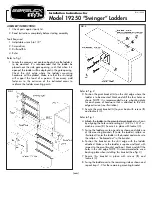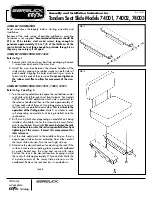
5
Basic safety instructions
BlueShadow Detector 40D Instructions V7647
2.5 Working with solvents
2.5.1 General requirements
The users are trained for handling different solvents .
Note recommended solvents and concentrations in these instructions
in order to avoid personal injury or damage to the device . For exam-
ple, certain chemicals may cause PEEK capillaries to swell or burst
(see „12 Chemical compatibility of wetted materials“, p . 61) .
Note that organic solvents are toxic above a certain concentration .
For handling hazardous solvents see next section .
Mobile phases and samples may contain volatile or combustible sol-
vents . Avoid the accumulation of these substances . Ensure good ven-
tilation of the installation site . Avoid open flames and sparks . Do not
operate the instrument in the presence of flammable gases or vapors .
Only use solvents which do not self-ignite under given conditions . This
applies especially to the use of a thermostat where liquids could get
onto hot surfaces in the interior .
Degas solvents before use and observe their purity .
2.5.2 Contamination by health-threatening solvents
Contamination with toxic, infectious or radioactive substances poses
a hazard for all persons involved during operation, repair, sale, and dis-
posal of a device .
All contaminated devices must be properly decontaminated by a spe-
cialist company or the operating company before they can be recom-
missioned, repaired, sold, or disposed (see „10 Disposal“, p . 58) .
2.5.3 Avoiding leakage
Risk of electrical shock or short circuit if solvents or other liquids leak into
the interior of the device . You can avoid a leakage through the following
measures:
Tightness: Visually check the device or system regularly for leaks .
Solvent tray: The use of a solvent tray prevents liquids get from the
bottles into the inside of the device .
Eluent lines: Install capillaries and hoses in such a way that, in case of a
leak, liquids cannot get into the interior of the devices underneath .
In case of leakage: Switch off the system . Only take the device into
operation if the cause of the leak has been resolved (see „8 Mainte-












































